シルクロードの今を征く Now on the Silk Road  サマルカンド3日目 サマルカンド3日目アイニ博物館 Aini Museum Visit in Samarkand 青山貞一 Teiichi Aoyama 池田こみち Komichi Ikeda 掲載月日:2015年3月7日 独立系メディア E-wave Tokyo 無断転載禁 |
シルクロードの今を征く Now on the Silk Road  サマルカンド3日目 サマルカンド3日目アイニ博物館 Aini Museum Visit in Samarkand 青山貞一 Teiichi Aoyama 池田こみち Komichi Ikeda 掲載月日:2015年3月7日 独立系メディア E-wave Tokyo 無断転載禁 |
|
総合メニュー(中央アジア)
下はアイニ氏の作品の数々です。 下から二段目には「ブハラ ある革命芸術家の回想」(発行日:1973年7月14日 アイニ 著、米内哲雄 訳)もあります。  撮影:青山貞一、Nikon Coolpix S8 2015-3-3 下は、「ブハラ ある革命芸術家の回想」(発行日:1973年7月14日 アイニ 著、米内哲雄 訳)の表紙です。 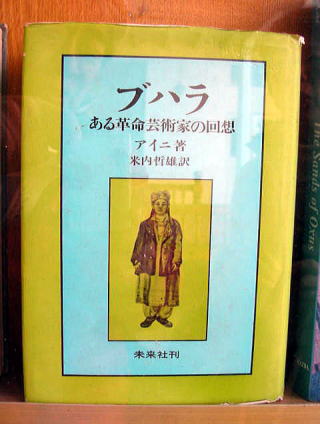 下の写真は、アイニ氏の自宅の一角にある絨毯の上のコタツ(サンドリ)です。まさに日本のコタツと同じです。 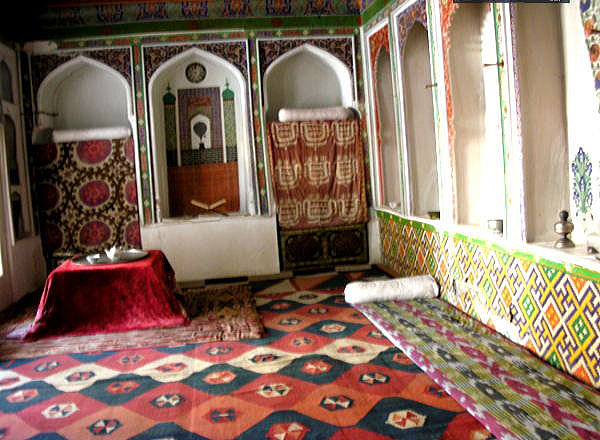 アイニ氏の自宅の一角にある絨毯の上のコタツ(サンドリ) 撮影:青山貞一、Nikon Coolpix S8 2015-3-3 上のコタツを含む部屋が絵画となっていました。 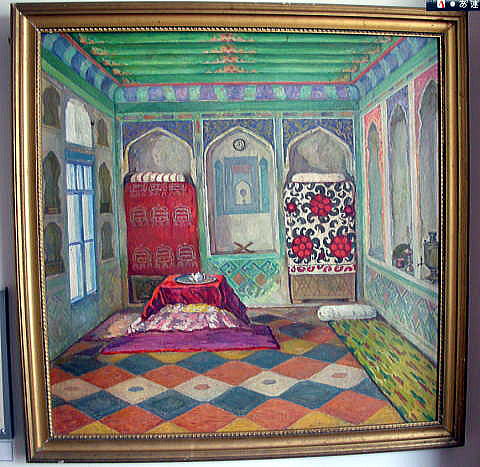 撮影:青山貞一、Nikon Coolpix S8 2015-3-3 なお、帰国後、グーグル検索で調べたところ、アイニ氏については、以下の記述がありました。
以下は英語のWikipedeia からの引用です。 ◆Sadriddin Ayni From Wikipedia, the free encyclopedia This article needs additional citations for verification. Please help improve this article by adding citations to reliable sources. Unsourced material may be challenged and removed. (May 2012) 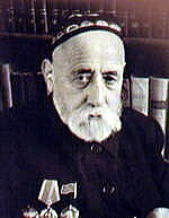 Sadriddin Ayni Born Emirate of Bukhara 27 April 1878 (ブハラで1878年4月27日誕生) Died 15 July 1954 (aged 76) (1954年7月15日死去) Nationality Soviet Union (国籍、ソビエト) Awards Order of Lenin (レーニン賞受賞) Sadriddin Ayni (Tajik: Садриддин Айн?, Persian: also Sadriddin Aini; 27 April 1878 - 15 July 1954) was a Tajik intellectual who wrote poetry, fictional writing, journalism, history and lexicography. He is regarded as Tajikistan's national poet and one of the most important writers in the country's history. アイニ氏はソビエト連邦共和国(CCCP)の記念切手に2度もなっていました。 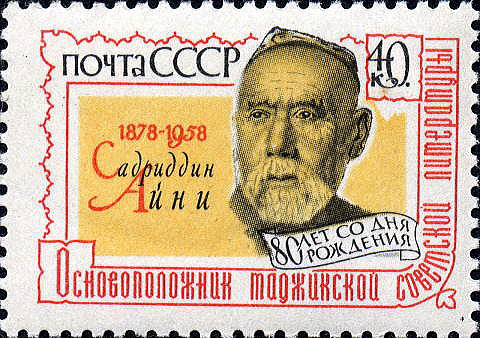 Sadriddin Ayni on a 1958 Soviet stamp. 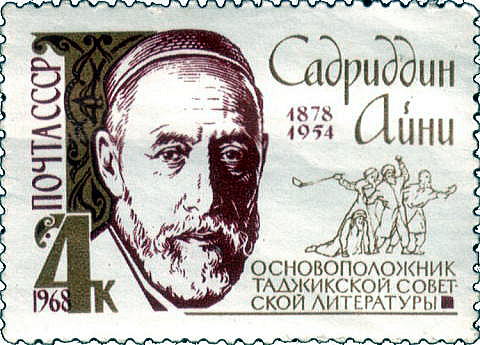 Sadriddin Ayni on a 1968 Soviet stamp. Biography Ayni was born in a peasant family in the village of Soktare in what was then the Emirate of Bukhara. He became an orphan at 12 and moved to join his older brother in Bukhara, where he attended a madrasa and learned to write in Arabic.[1] In the early 1920s Ayni helped to propagate the Russian Revolution in Uzbekistan and Tajikistan. In 1934 he attended the Soviet Congress of Writers as the Tajik representative. By purporting national identity in his writings, he was able to escape the Soviet censors that quieted many intellectuals in Central Asia. Ayni survived the Soviet Purges, and even outlived Stalin by one year. He was member of the Supreme Soviet of Tajikistan for 20 years, was awarded the Order of Lenin three times, and was the first president of the Academy of Sciences of Tajik SSR. After 1992, his writing helped to bind together a sense of Tajik nationalism that survived the collapse of the Soviet Union. Ayni gave indigenous Tajik literature in Tajikistan a boost in 1927 by writing Dokhunda, the first Tajikistani novel in the Tajik language.His main work is the four-volume Yoddoshtho Ayni's early poems were about love and nature, but after the national awakening in Tajikistan, his subject matter shifted to the dawn of the new age and the working class. His writings often criticized the Amir of Bukhara. Two recognizable writings include The Slave and The Bukhara Executioners. Ayni died in Dushanbe, the capital of Tajikistan, where a mausoleum stands in his honor Demolishing Ayni's House in Samarkand According to RFERL Tajik Service, Ayni's house in Samarkand is under threat of demolition by the Uzbekistan Government.[2] つづく |